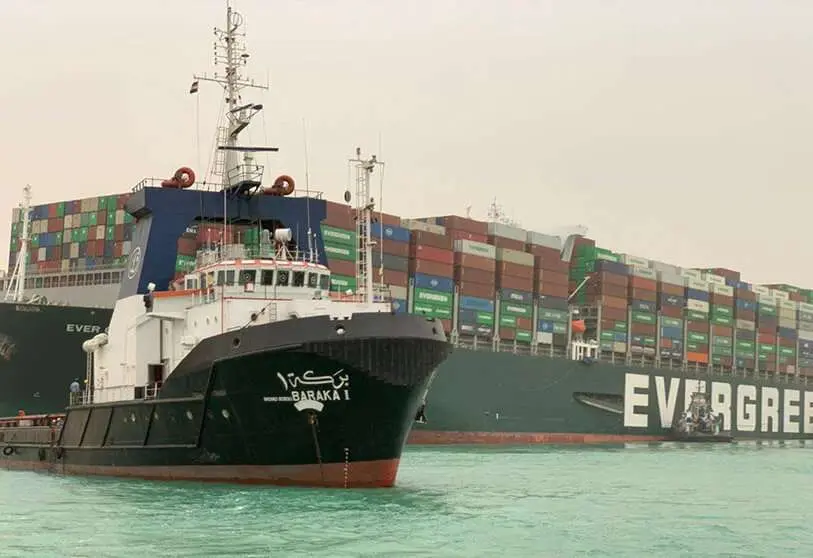400 million in losses per hour due to Suez Canal blockade

So far, trawlers and bulldozers have failed to dislodge the huge container ship called EverGiven that remains stuck in the Suez Canal for a third day, raising the prospect of a prolonged delay in what is arguably the world's most important waterway. Faced with the blockage the vessel has created, Egypt has opened an old section of the canal to divert traffic, fearing the closure could drag on. Eight tugboats continue to work on the operation to reopen the canal traffic, which the authorities say could take days. The best chance of freeing the ship may not come until Sunday or Monday, when the tide is at its zenith, according to Nick Sloan, head of the rescue operation in charge of refloating the Costa Concordia, a cruise ship that capsized off the coast of Italy in 2012.
The accident began on Tuesday when strong winds blew through the region and kicked up sand on the banks of the 120-mile channel that links the Mediterranean Sea in the north to the Red Sea in the south. The waterway is narrow, less than 205 metres in places, and can be difficult to navigate when visibility is poor, but the EverGiven continued its course through the canal, en route to Rotterdam from China. As storms reached 46mph, the crew lost control of the ship and it drifted into a sand embankment, closing almost the entire canal. The Panama Maritime Authority, which is responsible to the International Maritime Organisation (IOM) for all investigations of accidents or incidents occurring on board Panamanian-flagged vessels such as the EverGiven, has announced that it will open an investigation into the accident.

A rough estimate shows that the cost of the canal blockage is almost $400 million per hour, according to Lloyd's List calculations, with westbound traffic worth about $5.1 billion per day, and eastbound traffic worth about $4.5 billion, as quoted by Bloomberg.
The economic consequences of the incident are worsening as the hours go by. Salvatore Mercogliano, an associate professor at Campbell University in North Carolina, revealed that the incident will initially affect Europe and Asia. "Every day that the canal is closed means that Egypt is not collecting the toll of about $700,000 for every ship that goes through, but more importantly, container ships are not delivering food, fuel, manufactured goods to Europe, nor are goods that are exported from Europe coming to the Far East and that has a massive impact on production and availability of goods in Europe and Asia," he said.

On Wednesday, 185 ships were waiting to cross the canal, according to shipping data compiled by Bloomberg, while Lloyd's estimated 165 ships. About 34 container ships chartered by Maersk and other shipping lines are stuck in the canal or en route, according to the supply chain tracker. In addition, initial reports indicate that 10 tankers carrying a total of 13 million barrels may be affected by the disruption, according to Arthur Richter, senior shipping analyst at Vortexa. The closure of the Suez Canal may directly affect European and US refineries, which rely in part on the waterway to receive shipments of barrels of oil from the Middle East. Faced with this situation, they should look for alternative routes, which are obviously more expensive and have a direct impact on the price of crude oil. Dozens of ships pass through each day carrying 4 million barrels of oil, just over 4% of the world's total crude oil production and 9% of the oil traded by sea.
Approximately 12% of world trade passes through the Suez Canal, making it so strategic that world powers have fought a battle for the waterway since its completion in 1869. This accident is causing another setback for global supply chains already strained by the rise of e-commerce associated with the COVID-19 pandemic.








